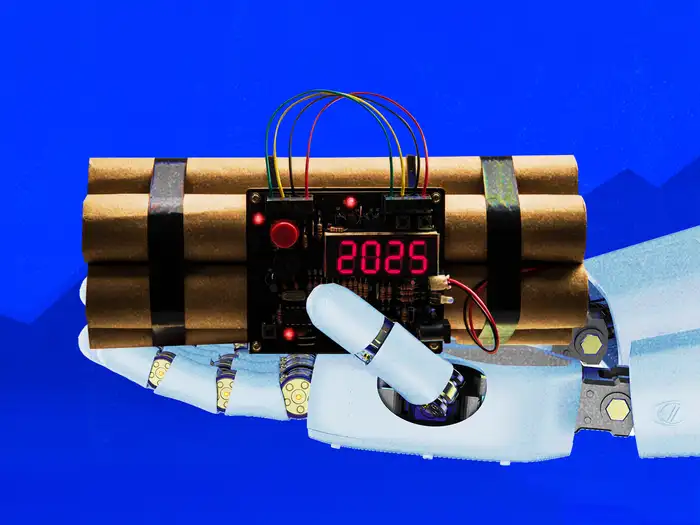Microsoft Copilot’s underperformance is the latest red flag for investments in AI

Welcome back! The fast-moving, big business of weight-loss drugs is already shifting to its next stage. Here’s a rundown of five upcoming pills and injections to keep an eye on.
In today’s big story, Microsoft’s massive bet on AI with Copilot has yet to live up to the hype, potentially raising alarms for everyone else investing in the space.
What’s on deck:
- Markets: You can still bet on politics even though the election is over.
- Tech: Why the Trump-Musk relationship is unlike anything we’ve ever seen in US politics.
- Business: Spirit Airlines has filed for Chapter 11 bankruptcy protection, but tells customers it’ll keep flying.
But first, is this thing even worth it?
The big story
A Copilot conundrum

Microsoft’s challenges with its flagship AI product could be another red flag for an industry with high hopes for the tech.
B-17, has a deep dive on Copilot coming up short on the big expectations laid out for it when it launched over a year ago.
CEO Satya Nadella didn’t hold back initially, describing Copilot as something that would “fundamentally transform our relationship with technology” when it was unveiled.
But internally and among clients, that doesn’t always feel like the case. One Microsoft executive told Ashley that Copilot offers useful results about 10% of the time.
“The rest of the time it’s: Why do we even try?” they said.
It’s an unsettling realization considering the stakes of AI. Many companies — and arguably the entire US stock market — are banking on generative AI being revolutionary. And while Microsoft’s bet on AI dwarfs almost everyone else’s, its hangup with the tech is something a company of any size can relate to: Is this stuff worth it?
It’s also not the only challenge the generative AI space is navigating.
Reports about OpenAI’s newest AI model struggling to show big improvements raised questions about the tech hitting a performance wall. CEO Sam Altman appeared to address it with a cryptic tweet: “there is no wall.”
Still, it’s feeding concerns about the timeline for artificial general intelligence. AGI is the concept that autonomous computer systems outperform humans at most economically valuable work, but it appears harder to achieve than previously anticipated, writes B-17.

The counterargument is straightforward: It’s still the early innings.
Microsoft is adamant its Copilot investment is already paying off. Jared Spataro, a vice president of marketing for Microsoft 365, pointed Ashley to Copilot success stories like Lumen Technologies, which projects $50 million in annual savings from its sales team’s use of Copilot.
Some customers aren’t necessarily worried either, as they continue to plow money into AI. A Flexera survey found OpenAI ranked fourth among vendors that IT leaders plan to spend the most with next year.
But tech players won’t have forever to figure things out. Earlier this year, analysts at Barclays highlighted an under-the-radar risk to AI bets: the depreciation costs related to AI chips. As firms look to stock up on GPUs, they run the risk of the tech no longer being relevant as new iterations emerge.
And then there’s the possibility of internal drama. Ashley previously reported on the pay disparity at Microsoft between AI-focused employees and everyone else.
“AI is great and it might be the future, but when are you going to focus on your billpayers?” one employee told Ashley.
3 things in markets

1. A lawsuit about trade secrets has a corner of Wall Street’s data industry enthralled. Yipit, a Carlyle-backed provider of credit-card data, filed a lawsuit accusing two former salespeople of stealing intellectual property to use in their new roles at rival MScience. The suit has the attention of the young, fiercely competitive industry that sells non-traditional data to investors looking for an edge.
2. Just because the election is over doesn’t mean you need to stop betting on politics. Who will be the Republican nominee in 2028? Will Matt Gaetz be confirmed as attorney general? Will Trump create a national Bitcoin reserve? The prediction markets have plenty of political outcomes to scratch your gambling itch.
3. It’s giving the year 2000 for one legendary investor. Rob Arnott compared the current market to the dot-com peak in 2000. Arnott told B-17 why a bear market could be forthcoming in the next couple of years thanks to high valuations and AI optimism that is largely priced in.
3 things in tech

1. Elon Musk’s incredible hold on US politics. Politics and money have always been intertwined, but the current relationship between the world’s richest man and the president-elect is unprecedented. The result is Musk acting almost as a shadow president.
2. A potential Trump trade plan beneficiary: US semiconductor jobs. If Trump’s proposed trade plan is enacted, the American semiconductor industry could see hiring growth. Industry experts told B-17 that tariffs on foreign-made chips could help level the playing field for US chipmakers, which have faced tough competition from their global counterparts.
3. The OpenAI mafia swells its ranks. Nearly two dozen former employees have left the AI juggernaut and founded startups of their own. The latest defectors include OpenAI cofounder and former chief scientist Ilya Sutskever and former chief technology officer Mira Murati. See what they’re up to now.
3 things in business

1. Four ways Trump’s housing plans could hurt homebuyers and three ways it could help. Trump promised to make housing more affordable in part by deporting millions of immigrants, slashing construction regulations, and building houses on federal land. Here’s how experts think that would actually pan out.
2. Spirit Airlines has filed for Chapter 11 bankruptcy protection. The budget airline has struggled since a planned merger with JetBlue was called off in March. In an open letter to customers, it said people can continue to book tickets and fly as normal as it undergoes financial restructuring.
3. Walmart might be just fine under Trump’s proposed trade plan. Target, not so much. As America’s grocery king, Walmart US makes nearly 60% of its revenue from groceries, which are predominantly domestic. But Target often relies on imported merchandise, such as apparel and beauty. Walmart also has another key advantage: scale.






